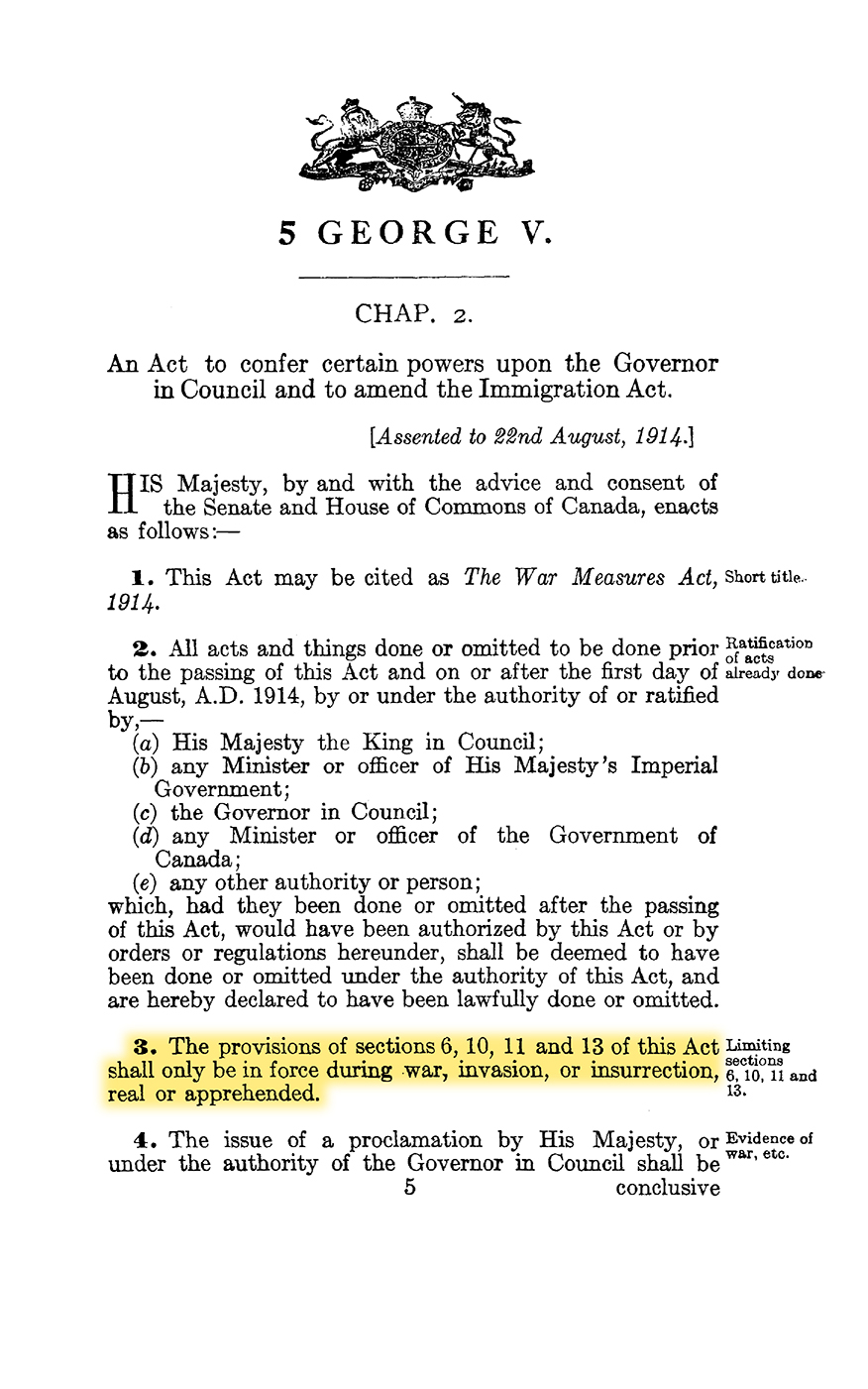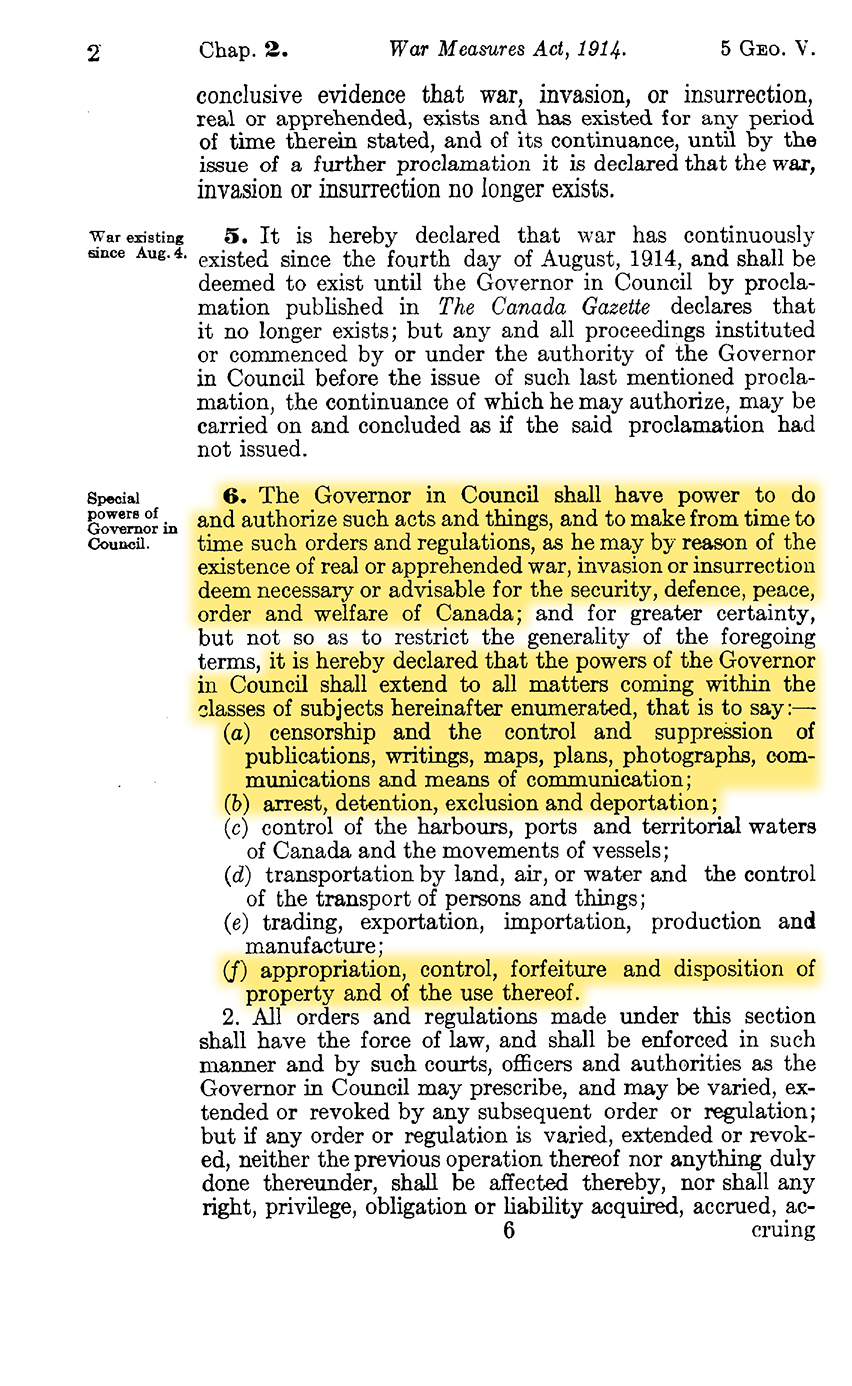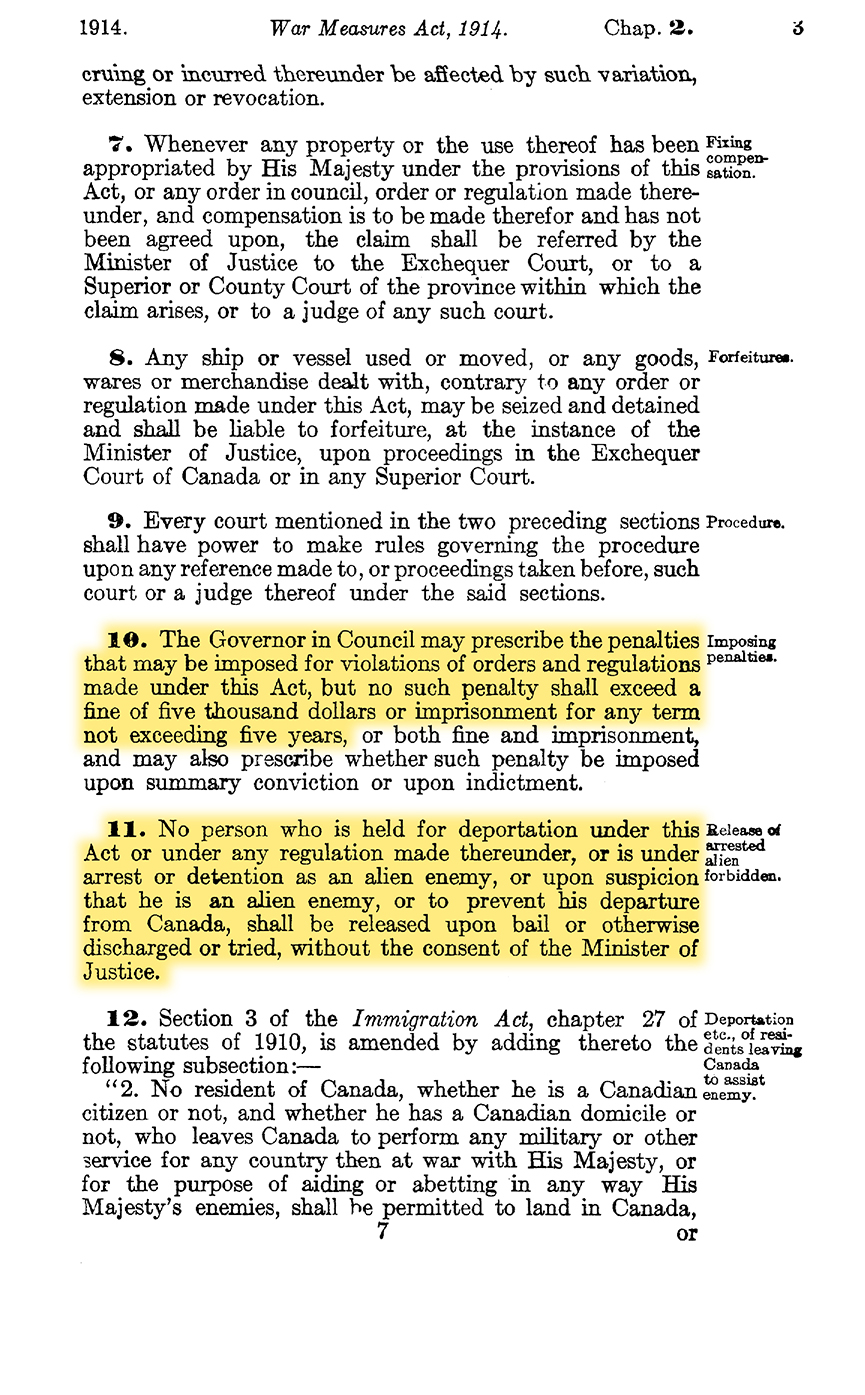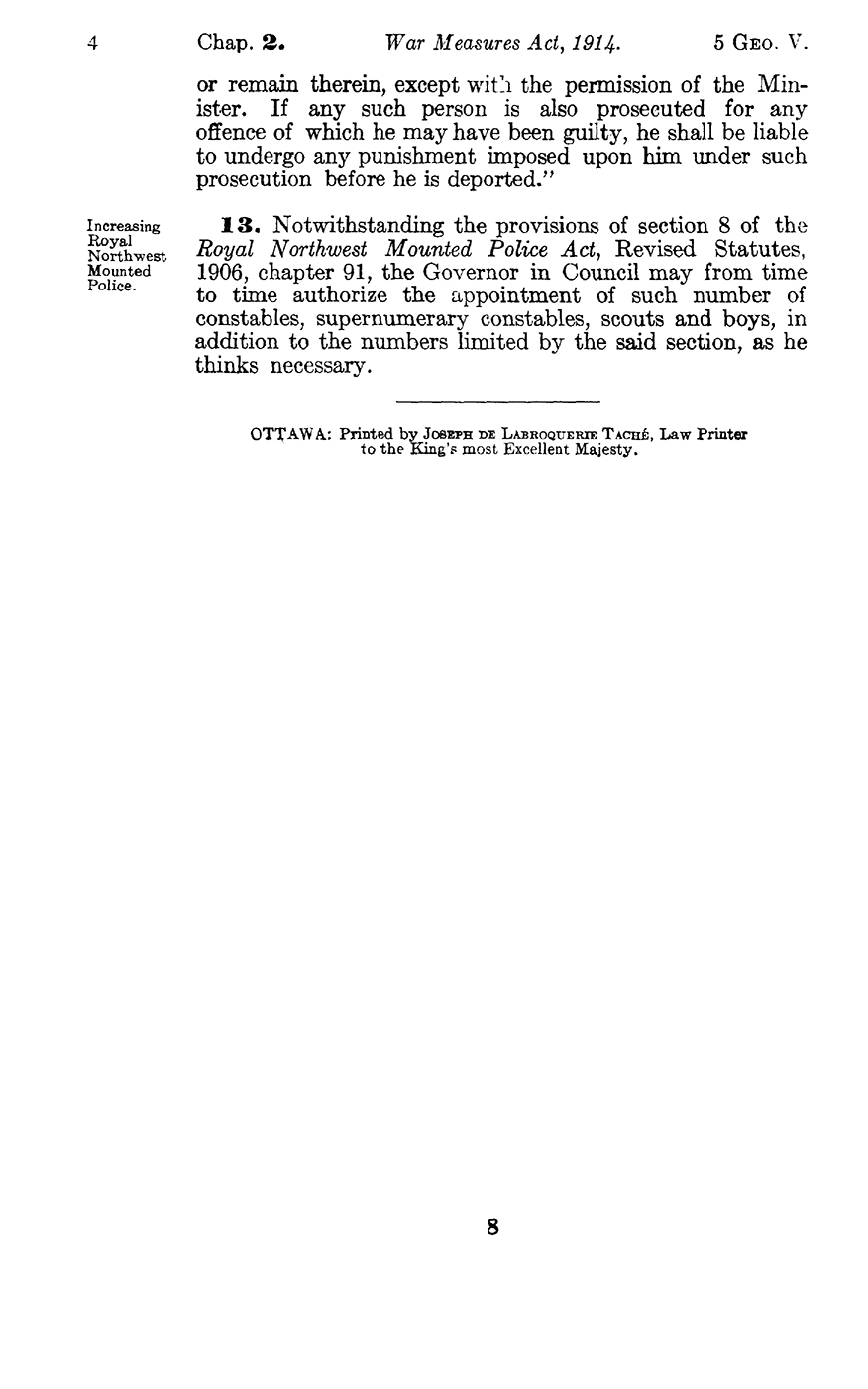War Measures Act
Document
Image
Video
Audio
 Activities
Activities
LOOK
Read the key points of the War Measures Act (see the transcript below). Explain each point in your own words.
THINK
Read the key points of the War Measures Act (see the transcript below). Which points directly affect human rights or civil liberties?
THINK
Do you think the passing of the War Measures Act in 1914 was historically significant? Explain your reasoning. To inform your answer, read the historical context below.
Hint: Moments in history and primary sources are considered historically significant if they result in change, reveal something important about history, or occupy a meaningful place in the historical narrative.
DO
Read the key points of the War Measures Act (see the transcript below). With a friend, create a word cloud of all the important words. You can make one on your own, or use a website (such as wordclouds.com) to help you.
Looking at your word cloud, what types of words are listed? Are they positive or negative? What can your word cloud tell you about the War Measures Act?
Details
 Materials
Materials - Paper
- Ink
Transcript
| Key Sections | |
| 3. The provisions of section 6, 10, 11 and 13 of this Act shall only be in force during war, invasion or insurrection, real or apprehended. | Only to be Available During Wartime
Sections 6, 10, 11, and 13 of the War Measures Act are only enforceable during times of war or danger to Canada, either real or expected. Section 6 outlines the power of the Governor in Council (who is the Prime Minister and his cabinet). Section 10 describes the penalties given to those who are arrested or fined under this Act. Section 11 states the release of arrested enemy aliens is forbidden. Section 13 allows for increases to the Royal Northwest Mounted Police (which would later become the Royal Canadian Mounted Police). |
| 6. The Governor in Council shall have power to do and authorize such acts and things, and to make from time to time such orders and regulations, as he may by reason of the existence of real or apprehended war, invasion or insurrection deem necessary or advisable for the security, defence, peace, order and welfare of Canada. | To Protect the Security, Defense, Peace, Order and Welfare of Canada
The War Measures Act, 1914 gives many powers to the Governor in Council, who is the Prime Minister acting on advice of Cabinet. These powers are given to the Governor in Council so that it is not necessary to go through Parliament to pass wartime orders and regulations.
The powers given to the Governor in Council are to protect the security, defense, peace, order and welfare of Canada from threatening forces. |
| 6. It is hereby declared that the powers of the Governor in Council shall extend to all matters coming within the classes of subjects hereinafter enumerated, that is to say: —
(a) censorship and the control and suppression of publications, writings, maps, plans, photographs, communications and means of communication; (b) arrest, detention, exclusion and deportation; (f) appropriation, control, forfeiture and disposition of property and the use thereof. |
The Powers of the Governor in Council
The War Measures Act, 1914 gave the Governor in Council the following powers:
f) The ability to take property and use it however they wanted. This included family homes and businesses. |
| 10. The Governor in Council may prescribe the penalties that may imposed for violations of orders and regulations made under this Act, but no such penalty shall exceed a fine of five thousand dollars or imprisonment for any term not exceeding five years. | Penalties and Fines
The penalties for anyone who was deemed a threat to the security of Canada, or stood up against the War Measures Act, 1914 could be fined up to $5,000 (around $115,000 in 2021) and imprisoned for up to five years. Imprisonment included traditional prisons, but also being detained in internment camps.
Punishments were given to people who not only acted in a way that was deemed threatening but who also said things that were considered anti-Canadian, or anti-government. |
| 11. No person who is held for deportation under this Act … or is under arrest or detention as an alien enemy … shall be released upon bail or otherwise discharged or tried, without the consent of the Minister of Justice. | Release of “Enemy Aliens” Forbidden
The Minister of Justice was the only person who could allow a person imprisoned under the War Measures Act to be released. This gave one person an incredible amount of power over those imprisoned. |
Historical Context
Choose one of the three levels below to match your needs.
- The War Measures Act gave the federal government sweeping powers to conduct the war, while ensuring the “security, defence, peace, order and welfare of Canada.”
- The Act restricted civil liberties for hundreds of thousands of Canadians, censored the media, required registration for certain groups, and suspended freedom of expression and association (the freedom to join and leave groups voluntarily).
- People from countries at war with Canada — particularly Germany and the Austro-Hungarian and Ottoman Empires — were the most affected.
The War Measures Act gave the federal government sweeping powers to conduct the war, while ensuring the “security, defence, peace, order and welfare of Canada.”
The War Measures Act restricted civil liberties for hundreds of thousands of Canadians. It also imposed censorship, required registration for certain groups, and suspended freedom of expression and association, as well as legal protections.
Canadians from countries at war with the British Empire, who were labelled “enemy aliens,” were particularly affected. Around 8,500 of them were arrested and detained without cause or due process between 1914 and 1920.
Hastily drawn up in 1914 and unanimously adopted by Parliament, the War Measures Act gave the government sweeping powers to conduct the war, while ensuring the “security, defence, peace, order and welfare of Canada.” Ministers did not have to go through Parliament to pass wartime orders and regulations. The law allowed the suspension of civil liberties in the name of national security, and remained in effect until January 1920.
The War Measures Act restricted civil liberties for hundreds of thousands of Canadians. It also imposed censorship, required registration for certain groups, and suspended freedom of expression and association, as well as legal protections.
Canadians from countries at war with the British Empire, who were labelled “enemy aliens,” were particularly affected. Around 8,500 of them were arrested and detained without cause or due process between 1914 and 1920.
The reasons for internment were many — and often arbitrary. They included being jobless, committing a legal infraction, or trying to leave the country.
- The War Measures Act gave the federal government sweeping powers to conduct the war, while ensuring the “security, defence, peace, order and welfare of Canada.”
- The Act restricted civil liberties for hundreds of thousands of Canadians, censored the media, required registration for certain groups, and suspended freedom of expression and association (the freedom to join and leave groups voluntarily).
- People from countries at war with Canada — particularly Germany and the Austro-Hungarian and Ottoman Empires — were the most affected.
The War Measures Act gave the federal government sweeping powers to conduct the war, while ensuring the “security, defence, peace, order and welfare of Canada.”
The War Measures Act restricted civil liberties for hundreds of thousands of Canadians. It also imposed censorship, required registration for certain groups, and suspended freedom of expression and association, as well as legal protections.
Canadians from countries at war with the British Empire, who were labelled “enemy aliens,” were particularly affected. Around 8,500 of them were arrested and detained without cause or due process between 1914 and 1920.
Hastily drawn up in 1914 and unanimously adopted by Parliament, the War Measures Act gave the government sweeping powers to conduct the war, while ensuring the “security, defence, peace, order and welfare of Canada.” Ministers did not have to go through Parliament to pass wartime orders and regulations. The law allowed the suspension of civil liberties in the name of national security, and remained in effect until January 1920.
The War Measures Act restricted civil liberties for hundreds of thousands of Canadians. It also imposed censorship, required registration for certain groups, and suspended freedom of expression and association, as well as legal protections.
Canadians from countries at war with the British Empire, who were labelled “enemy aliens,” were particularly affected. Around 8,500 of them were arrested and detained without cause or due process between 1914 and 1920.
The reasons for internment were many — and often arbitrary. They included being jobless, committing a legal infraction, or trying to leave the country.
Summary
- The War Measures Act gave the federal government sweeping powers to conduct the war, while ensuring the “security, defence, peace, order and welfare of Canada.”
- The Act restricted civil liberties for hundreds of thousands of Canadians, censored the media, required registration for certain groups, and suspended freedom of expression and association (the freedom to join and leave groups voluntarily).
- People from countries at war with Canada — particularly Germany and the Austro-Hungarian and Ottoman Empires — were the most affected.
Essential
The War Measures Act gave the federal government sweeping powers to conduct the war, while ensuring the “security, defence, peace, order and welfare of Canada.”
The War Measures Act restricted civil liberties for hundreds of thousands of Canadians. It also imposed censorship, required registration for certain groups, and suspended freedom of expression and association, as well as legal protections.
Canadians from countries at war with the British Empire, who were labelled “enemy aliens,” were particularly affected. Around 8,500 of them were arrested and detained without cause or due process between 1914 and 1920.
In-Depth
Hastily drawn up in 1914 and unanimously adopted by Parliament, the War Measures Act gave the government sweeping powers to conduct the war, while ensuring the “security, defence, peace, order and welfare of Canada.” Ministers did not have to go through Parliament to pass wartime orders and regulations. The law allowed the suspension of civil liberties in the name of national security, and remained in effect until January 1920.
The War Measures Act restricted civil liberties for hundreds of thousands of Canadians. It also imposed censorship, required registration for certain groups, and suspended freedom of expression and association, as well as legal protections.
Canadians from countries at war with the British Empire, who were labelled “enemy aliens,” were particularly affected. Around 8,500 of them were arrested and detained without cause or due process between 1914 and 1920.
The reasons for internment were many — and often arbitrary. They included being jobless, committing a legal infraction, or trying to leave the country.





